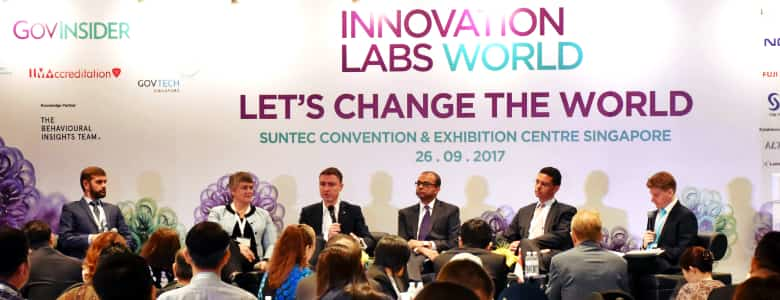A World of Smart Nations

As digitalisation transforms the world, governments across the globe are mobilising to get ‘smart’ about the ways in which they interact with their citizens.
Singapore is no different — Prime Minister Lee Hsien Loong officially launched the Smart Nation initiative in November 2014, and three years on, our little island’s transformation into a Smart Nation is well underway.
“In the execution of Singapore’s Smart Nation initiative, we have three major objectives,” said Dr Janil Puthucheary, Senior Minister of State (Communications and Information, Education) and Minister-in-Charge of the Government Technology Agency of Singapore (GovTech).
“First, we will improve our citizens’ everyday convenience and their quality of life. Second, we will drive greater enterprise efficacy and support new areas of innovation. Third, the expectation, and correctly so, is for us to be inclusive for all Singaporeans from the start.”
Dr Puthucheary was speaking at GovInsider’s Innovation Labs World conference held at the Suntec Convention Centre on 26 September 2017.
(Editor: You can read the full speech here.)
He also engaged in a lively panel discussion on global Smart Nation trends with distinguished international speakers, which was moderated by GovInsider Editor, Mr Joshua Chambers.
The panel included Mr Pedro Conceição, director of strategic policy at the Bureau for Policy and Programme Support under the United Nations Development Programme; Mr Taavi Rõivas, former Prime Minister of Estonia; Ms Maria Robertson, deputy chief executive of service delivery and operations at the Department of Internal Affairs, New Zealand; and Mr Roman Aleshkin, product owner of the Polys Online Voting Solution, Kaspersky Labs.
Reaching higher with platforms
Dr Puthucheary outlined five core digital platforms that are being rolled out in Singapore at the national level: The National Digital Identity framework, the e-payments platform, the Smart Nation Sensor Platform, the Smart Urban Mobility initiative and the Moments of Life initiative.
Each of these platforms taps into the latest available technologies and is custom-made for a specific purpose, said Dr Puthucheary. He emphasised that every platform is designed to be interoperable so that the flow of information between them is seamless, and synergies can arise from complementary functions.
“Any platforms we build must not just adopt the most advanced technologies, they must also be publicly accessible and interoperable. This is important because as a government, we are building platforms not for profit, but for delivering a public good,” he added.
But functionality in and of itself is not the final goal. “The most important consideration of all is that our platforms must continue to maintain the longstanding trust that Singaporeans have in their government and public services,” said Dr Puthucheary.
For the people, by the people
In the creation of Smart Nation services, a consultative approach to development is critical in ensuring that no segment of society gets left out.
Dr Puthucheary thus emphasised the need to design products and services with input from citizens from all walks of life. The ideals of inclusiveness and conscientious design were echoed by Mr Conceição, who noted that Smart Nation technologies and platforms are simply tools for the government to better communicate with their citizens.
Authorities should not get so caught up in the development process that they lose sight of the goals of the final product; instead, they should always remember to put citizens at the centre of Smart Nation initiatives, he added.
“Technology can of course be an enabler, and we should look at what it offers. But let’s not focus on it as the endgame,” said Mr Conceição. “The endgame has to be: what are we doing for people?”
Lessons from abroad
As Singapore pursues its Smart Nation goals, it can learn from other countries that have successfully implemented their own platforms for digital governance.
Estonia, for example, is renowned for being one of the most advanced digital societies in the world, and its former Prime Minister was happy to share about the concept of Estonian e-Residency.
“Anyone in the world can apply for this e-Residency and receive a government-issued digital ID,” said Mr Rõivas. This would allow an individual to start and run a global business in Estonia without physically residing in the country.
“[In Estonia] 99 percent of the services interacting with the government are digital, which means that they are faster, more convenient and more transparent. You cannot bribe a computer,” he added.
New Zealand, meanwhile, has kicked off its Smart Nation ambitions with its cross-agency SmartStart platform, which allows new parents to register their babies’ data and access various healthcare- and administration-related services in one location, said Ms Robertson.
But perhaps the definitive sign that a government has truly embraced the Smart Nation concept is its willingness to completely digitise the democratic process. The technology for a secure online voting platform is already available, and will make elections more efficient and transparent, said Mr Aleshkin.
Dr Puthucheary concluded by emphasising the government’s continued commitment to making government digital services more secure, user-friendly and intuitive for citizens.
“Ultimately this Smart Nation journey has to generate benefits for our economy, which translates into opportunities for business and jobs for Singaporeans. We have to think about how we can restructure our economy, our government and our society to take full advantage of these opportunities that have been presented to us,” he said.
https://www.tech.gov.sg/media/technews/a-world-of-smart-nations
